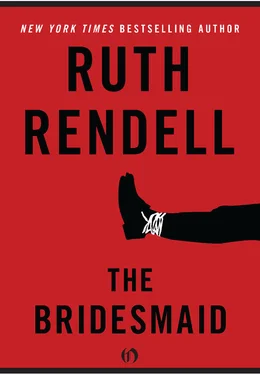Ruth Rendell - The Bridesmaid
Здесь есть возможность читать онлайн «Ruth Rendell - The Bridesmaid» весь текст электронной книги совершенно бесплатно (целиком полную версию без сокращений). В некоторых случаях можно слушать аудио, скачать через торрент в формате fb2 и присутствует краткое содержание. Год выпуска: 2010, Издательство: Open Road Integrated Media LLC, Жанр: Триллер, на английском языке. Описание произведения, (предисловие) а так же отзывы посетителей доступны на портале библиотеки ЛибКат.
- Название:The Bridesmaid
- Автор:
- Издательство:Open Road Integrated Media LLC
- Жанр:
- Год:2010
- ISBN:нет данных
- Рейтинг книги:3 / 5. Голосов: 1
-
Избранное:Добавить в избранное
- Отзывы:
-
Ваша оценка:
- 60
- 1
- 2
- 3
- 4
- 5
The Bridesmaid: краткое содержание, описание и аннотация
Предлагаем к чтению аннотацию, описание, краткое содержание или предисловие (зависит от того, что написал сам автор книги «The Bridesmaid»). Если вы не нашли необходимую информацию о книге — напишите в комментариях, мы постараемся отыскать её.
The Bridesmaid — читать онлайн бесплатно полную книгу (весь текст) целиком
Ниже представлен текст книги, разбитый по страницам. Система сохранения места последней прочитанной страницы, позволяет с удобством читать онлайн бесплатно книгу «The Bridesmaid», без необходимости каждый раз заново искать на чём Вы остановились. Поставьте закладку, и сможете в любой момент перейти на страницу, на которой закончили чтение.
Интервал:
Закладка:
“I’d been observing him,” she said. “I’ve been over to that house you showed me twice in the past week. I found out he takes his dog out for a walk in these woods every morning before he goes to work. I calculated he’d still do it on a Sunday but he’d be a bit later—and he was. I waited there, hiding in the trees, and saw him come with his dog.”
If any doubts about the falseness of what she said still lingered, this would have dispelled them. Gerard Arnham with a dog! Philip remembered how Christine had told him Arnham didn’t care for dogs, had cited this as a reason for not taking him with them on that fateful day. It provided him with a question for Senta, a policeman’s sort of question aimed at ferreting out the kind of information which the liar may have left unconsidered.
“What kind of a dog?”
“Quite a little one, black.” She answered at once. She was prepared with her circumstantial details. “A Scottie, are they called? If it had been a big fierce doberman, Philip, I probably wouldn’t have been able to do what I did. I chose Arnham, you know, because he was your enemy. You’d told me he was your enemy, so that’s why I picked him.”
Philip wanted to ask her what Arnham looked like, but he remembered what had happened last time he seemed to doubt her stories. He tried to think of ways of rephrasing that question.
“It’s an interesting thing that a girl will be quite frightened if she meets a man she doesn’t know in a wood,” she said, “but a man’s not frightened if a girl comes up to him. I came up to him holding my eye. I said I’d got something in my eye and it was hurting and I couldn’t see out of it and I was frightened. That was clever, don’t you think?”
“He’s a very tall man, isn’t he?” Philip was proud of himself. This was the kind of thing he had come across in police procedural serials on television. “He must have had to bend right over to look at your eye.”
“Oh, he did, he did. He bent right down and I held my face up for him to see my eye.” She nodded with a kind of pleased satisfaction. And Philip found himself smiling at this second and surely final confirmation, all that was needed. Arnham was no more than five feet eight, if that. “He was as near to me as you are now. I knew where to strike. I stabbed him in the heart with a glass dagger.”
“You what?” said Philip, half-amused now by her inventiveness.
“Didn’t I ever show you my Venetian dagger? They’re made of Murano glass, those daggers, and they’re as sharp as razors. When you plunge them in, they break off at the handle and they only leave a scratch to show. The victim doesn’t even bleed. I used to have two but I used the other one for something else and they’re both gone now. I bought them in Venice when I was on my travels. I did feel sorry for the poor little dog, though, Philip. It came running up to its dead master and it started this awful whimpering.”
He didn’t know much about Venice, he had never been there, and less about Venetian glass. But he wanted to ask her—he had to stop himself from asking her—if she had worn one of those bird-face masks and a black cloak.
“It will be in all the papers tomorrow,” she said. “I don’t usually see a paper but I shall buy one tomorrow to read about it. No, I know! I’ll go upstairs later and see it on their TV.”
First, she would have a bath in their bathroom. She didn’t think there was any blood on her, but whether there was or not, she felt less than clean after what she had done. That was why she had worn the dark red tunic, so that blood wouldn’t show if it splashed on to her. If there were any splashes, they must be tiny ones. She had conducted a thorough search of her clothes while in the train.
Philip followed her upstairs, up on to the first, then to the second floor. He had never been into the upper regions of the house before. It was uniformly shabby, dusty, and with a kind of dreary squalor. He glanced into a room where an unmade bed was piled with plastic sacks from whose open tops clothes spilt. Cardboard crates that had once contained tins of food were stacked against the walls. There were a lot of flies, buzzing about pendent light bulbs without shades. Senta went into a bathroom where the walls and ceiling were a shiny bright green, the floor composed of patches of variously coloured linoleum. She stripped off her clothes, leaving them in a heap on the floor.
An unexpected thing had happened. He felt no desire for her. He could looked at her naked, undeniably beautiful, and feel nothing. She was less than a picture, far less than a photograph, as unerotic as stone Flora. He closed his eyes, rubbed his closed eyes with his fists, opened them again, and watched her step into the water—and felt nothing. From the bath she talked to him about coming back in the train, her initial fear that she was followed, her later obsessive search for a spot of blood somewhere, her examination of her fingers and her nails. He felt afraid, out of control. It was the kind of thing he especially hated, crime, the stuff of thrillers, an absorption with hideous violent things.
He couldn’t stay in the bathroom with her. He wandered aimlessly in and out of rooms. She called after him in that sweet, rather high-pitched tone of hers, as if nothing had happened, as if he were a casual visitor.
“Go and have a look at the top floor. I used to live up there.”
He went up. The rooms were smaller and narrower, the ceilings sloping under the roof. There were three rooms, no bathroom, but a lavatory and a small kitchen with a very old oven in one corner and a space where perhaps a refrigerator had once stood. All the windows were closed and on one of the sills stood the green wine bottle he had seen from the street. It felt and smelt as if no window had been opened for months, years. Outside, the sun was shining, but it seemed remote, barriers of dirty glass like a fog hanging between here and that distant sunlight. Through the grey encrusted panes the roofs of Queens Park and Kensal were a faded photograph or one overexposed.
Philip had come up here for something to do. He had come to be alone with pain and with fear. But now he was distracted from those emotions. He walked about in a kind of wonderment. The rooms were dirty with the kind of dirt he was growing used to in this house, and the smell was thick, like burning rubber in places, in others sweet and fishy, in the lavatory, where the pan was dark brown, as sharp and yellow-sour as rotting onions. But these were rooms, this was accommodation. He found himself noting the kind of things it was his job to note, the big cupboards with their panelled doors, the floorboards, the sink of stainless steel, the curtain rails, the few pieces of furniture.
She was calling him. He came down to her and said, “Why did you move down to the basement?”
She burst out laughing, a long musical trill. “Oh, Philip, your face! You look so disapproving.” He tried to smile. “I didn’t like climbing all those stairs,” she said. “What did I want with all those rooms anyway?”
She dried herself and put on the silver dress with the grey flower, and they went out to a pub for lunch. He drove her to Hampstead and they sat in a pub garden and he ate chicken and chips in a basket while she had soup and salad and drank sparkling rosé Lambrusco. They went for a walk on the Heath, Philip spinning out the time, delaying their return to Tarsus Street. The way he felt, he thought it unlikely he would be able to make love to her. A terrible desolation had taken hold of him. What he thought of as his great love for her was all gone, vanished. The more she talked—and she talked of everything, of gods and men and magic, or murder, or what society calls crime, of herself and him and their future, of her past and her acting—the worse it became. She held his hand, and his cold hand lay inert in her warm one.
Читать дальшеИнтервал:
Закладка:
Похожие книги на «The Bridesmaid»
Представляем Вашему вниманию похожие книги на «The Bridesmaid» списком для выбора. Мы отобрали схожую по названию и смыслу литературу в надежде предоставить читателям больше вариантов отыскать новые, интересные, ещё непрочитанные произведения.
Обсуждение, отзывы о книге «The Bridesmaid» и просто собственные мнения читателей. Оставьте ваши комментарии, напишите, что Вы думаете о произведении, его смысле или главных героях. Укажите что конкретно понравилось, а что нет, и почему Вы так считаете.











